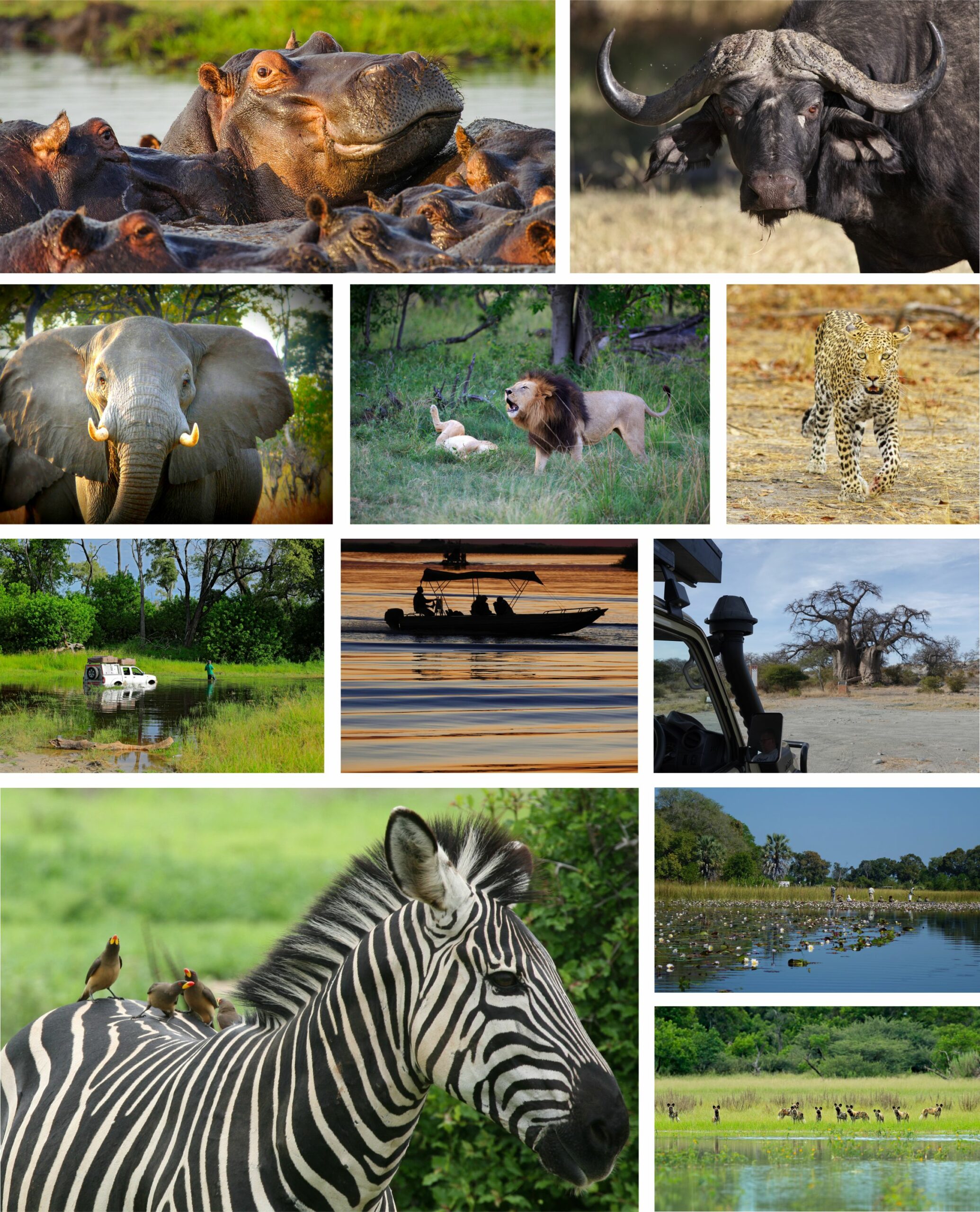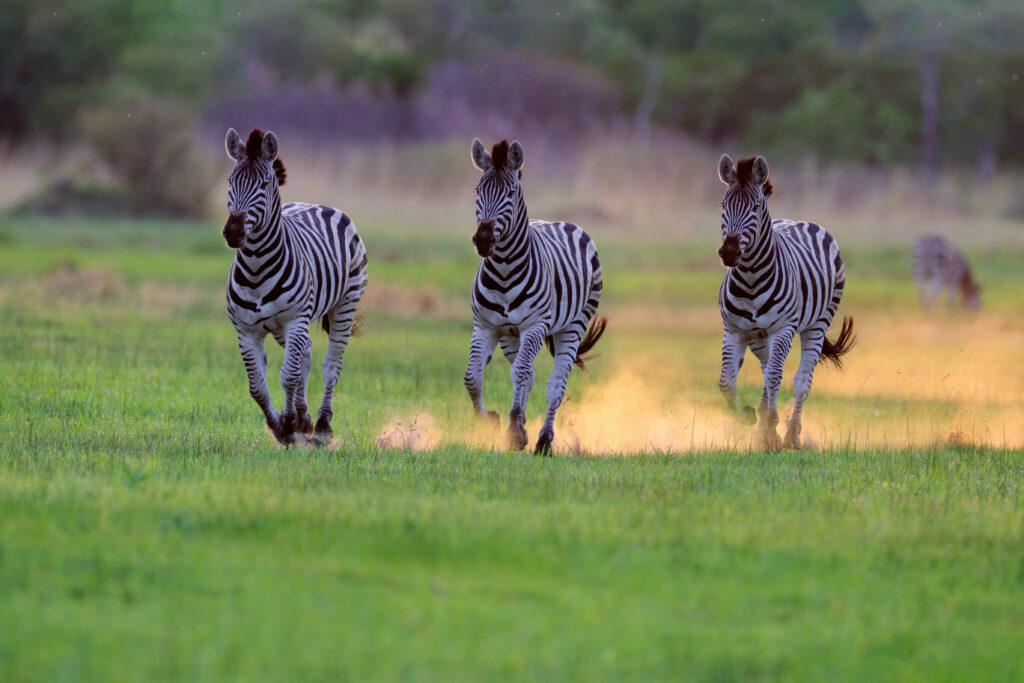My sister invites us to join them on a safari to Botswana. The prospect is terrifying. “You’ll be fine,” she says, “I’ll be with you all the way. I’ll sort out all the requirements. You just need to organise a roof-top tent.”
“It looks like fun! Come on.” My husband Bruce’s excitement is tangible as I scan the brochure.
‘Two nights at Cresta Marang with restaurant facilities…’ Okay, I can do this! It’s only a bit of camping and, besides, my sister will be with me. So we prepare for an epic two-week, 3 500 km safari through Botswana.
A borrowed rooftop-tent is bolted onto our newly acquired SUV and we’re warned about the flimsy ladder that has already been welded once before. I’m then introduced to my new BFF, a spade called Doug!
Then we receive terrible news. My brother-in-law has had a horrific accident. His recovery will be slow. I have to go without my sister. “What are you really afraid of?” she asks. I have a long list of fears even though I know that they are irrational. She sends me this quote:
“Nothing can harm you as much as your own thoughts unguarded.” Buddha.
We pack an industrial quantity of ‘stuff’ and head for the border, where we meet our leader and fellow adventurers. We form a convoy and head for the Khama Rhino Sanctuary.
There are no ‘go-ahead vehicles’ to set up camp, so we pitch our own tents and head off in search of the rhinos. They’re standing in the middle of the road, stamping their feet in dung marking their territory – and we’re in it.
It’s our first ‘real bush-braai’. There’s no power-hum, music, generators or cellphone signal…just bush-noises. Tiny pearl-spotted owls begin to hoot at each other and it’s time for bed and to deal with our first night in the rooftop tent. Bruce nimbly climbs up the ladder and reaches down to give me a helping hand. I’m halfway up when the ladder snaps and I tumble to the ground wrenching my ankle. I want to cry. I’m hot and tired and I want to go home! Bruce makes a makeshift ladder with the broken pieces and a fold-up table.
I’m not used to being up at sunrise, but guinea-fowl are running about cackling aimlessly as if the sun has risen just to hear them. We need an early start if we want to reach The Makgadikgadi Pans in daylight.
Each vehicle is handed a two-way radio. The convoy is instructed to halt. “
“Why, what’s wrong?” I’m already tense
“To let down our tyres,” says Bruce.
“What! Are you completely mad? Of what use are flat tyres?” Bruce ignores me and climbs out of the car into the blazing heat.
“Headlights on!” Another instruction.
“Really? It’s one o’clock!” But all the drivers obey and now I think that the heat has got to all of them and they’re all stark raving mad!
Clouds of white dust billow out behind each car. Visibility is virtually nil.
The Makgadikgadi Pan was once a vast inland lake. It’s now 12 000 sq. kms of absolutely nothing. As the dust settles, we discover that some vehicles have been left in the dust, literally!
The leader turns back to find the stragglers while the men get into a huddle and crack open St Louis beers.
The women are unperturbed about the lost vehicles and discuss books to read, movies to see, places to go… but I’m beginning to unravel, emotionally and physically. My fingernails are torn, my scratches are tender and my ankle is throbbing.
Kubu Island is a granite outcrop in the middle of this vast white desert. The Makgadikgadi Pans appear to be completely inhospitable. There are no ablution blocks but a long-drop, as squat as a troll, sits sullenly in the bleak sand. My other alternative is my new BFF, ‘Doug’.
Night falls quickly as we sit among the huge granite boulders and the giant baobab trees. The root-like branches claw the sky as if begging to be anchored in the parched earth below. The sunset blazes turning the giant granite boulders pink. The Pans are eerie, lunar-like and hauntingly beautiful.
I wish that I could share this moment with my sister but I remember her words, “Live for every moment because you can’t get it back.”
I know that travelling is not just about discovering new places. It’s about growing, learning, and experiencing gratitude. I also know that this safari is about discovering that ‘I can do this!’
Headlights on, we slot in behind the second vehicle and we follow a swirling dust-cloud across the crust of the Pans. The second vehicle soon loses sight of the lead vehicle, but six drivers have each faithfully followed the dust-bowl in front of them, so now we’re all lost. Once again the men get into a huddle and crack open St Louis beers. Note to self: Check if St Louis is the Patron Saint of Botswana.
The women are calm and climb out of their cars to chat. Okay my gut is starting to unknot. I can do this! Note to Bruce: Make sure that you’re second in the convoy tomorrow, right behind the leader.
It’s takes five hours to travel 100kms across the Pans to reach Maun, ‘Place of Reeds.’ A woman shoos a warthog out of her shop with a broom and pedestrians hastily step out of its path. A hand-painted sign leads us to a roadside vendor to weld the ladder.
Note to self: Read all brochures carefully before committing to a holiday. I re-read it. Yup! It says Sedia Lodge with restaurant facilities – it doesn’t say ‘camp next to Sedia Lodge on the banks of the River Thamalakane.’
Nevertheless, we take our sundowners to the river bank to watch the sunset. Isn’t it strange how sunsets appear different in every country?
Our excitement is palpable as we board a Cessna to fly over The Okavango Delta. It’s an exhilarating flight as our pilot skims the treetops and swoops down low giving us magnificent views of herds of buffalo, elephants, zebra, various antelope, giraffe, hippos and crocodiles. The Okavango Delta is 15 000 sq. kms of crystal clear water that winds through channels and islands. It’s lush, verdant and the life-blood of the thousands of species of mammals, birds, reptiles, insects and plants that thrive here… and then it mysteriously just disappears, fan-like, into the soft Kalahari sands.
We prepare for Xakanaxa. Our leader issues more instructions:
“You must be self-sufficient for the next six days! Stock up on food and water… Refuel the vehicles and jerry-cans… There will be no plug points for the next six days… Discard all citrus fruit.”
“Why?” I ask.
“Because the elephants will smell it and will come and fetch it!”
“Really? Even sealed inside my cooler-box?”
Our vehicles twist and sway in the soft sand. The two-way radio barks again: ”Engage four-wheel drive. Keep momentum. Don’t stop or you’ll sink into the soft sand.”
We head deep into Big Five Territory towards Xakanaxa, Moremi Game Reserve. There are two large elephants grazing on a jackalberry tree in our campsite. “Ignore them,” I’m told.
I can hear their stomachs rumbling. I stand at a safe distance, watching as the men crack open St Louis and the women begin to unpack their ‘stuff’.
Note to self: Do not pack your stuff in the bakkie first. You cannot reach your stuff over tool boxes, compressors, gas bottles, jerry cans, groceries, an industrial quantity of water, alcohol and cooler boxes the size of coffins.
Note to self: Make sure that you take everything that you think you may need up to your rooftop tent. You cannot come down again until daylight!
Darkness swallows the campsite and there are muffled sounds of hippos grunting in the nearby reeds.
My body is aching from being tossed about in the car and I thankfully snuggle down to watch the thick cluster of stars from our rooftop eyrie. A loud crash suddenly startles the camp. A huge hyena had tipped over the bin. It gobbles up our braai bones and then, with a hysterical serial-killer laugh, it lopes off into the cover of the darkness.
I spend a fitful night listening to the bush sounds through the thin canvas walls of the tent. I want to go home! We have to ford a river. I’m adamant, I won’t cross the river. “Use the radio. Tell them we’re turning back,” I demand of Bruce. Bruce ignores me and engages low-range gear and slowly drives through the river. Muddy water pours over the bonnet and then we’re through and climbing up the bank on the other side.
“Did you get that? Did you film that?”Bruce asks excitedly.
“No!” I snap, “I was too busy praying!” There’s another river to cross, but Bruce is still learning the tricks of his car and fails to check that the low-range gear is fully engaged. He stalls the car in mid-river. The muddy water surges over the bonnet and begins to seep through the door wetting my feet. I screech in utter panic. I want to go home!
There’s a flutter of butterflies in the long tawny grass. As we approach we realise that it’s a large nursery of resting baby impalas, their ears twitching like butterfly wings. Then we spot four lionesses crouched nearby. My heart contracts for this is the ruthless Circle of Life.
A bridge looms. It’s made of loose logs that roll as if one were walking on a barrel. We clatter over it… and shred a tyre. The men spring into action: car-jacks, spare wheel, spanners, advice and St Louis.
Once again the women are unperturbed about this mishap and point out the tiny birds perching on the sturdy maroon flowers of the sausage tree. An elephant mock charges the men, who calmly move to the relative safety behind the car. Forty minutes later we’re all back in convoy.
A dead buffalo lies bloated in the shallows and an old lion is tugging out yards of pink entrails. Giraffes tower above the trees and vast herds of buffalo, zebra and impala pass close by. A Kori bustard, Botswana’s National Bird, struts past us like a giant regal chicken on steroids.
There’s a leopard in a tree! It’s only 500m from our camp and perched on a low branch. It’s the most exquisite animal on the African continent. It’s our first sighting of a wild leopard. We feel so blessed. Later that night in our airless tent, we hear our first lion roar.
The next stop is Savuti Camp, Chobe Game Reserve, but nature is calling and there’s a tree up ahead. The men call it the’ lav-a-tree’…but three lionesses are lying under it trying to keep cool in the scant shade.
It’s scorchingly hot. Bruce pours us iced drinks and a beautiful butterfly, Botswana’s symbol of love, settles on my metal goblet delicately sipping the condensation droplets. A hornbill suddenly flies up and snatches the butterfly off my goblet, causing me to spill my drink.
We’ve been up since dawn, breaking-down camp and setting up camp and now I’m exhausted, hot and thirsty. Our ice has melted and the boerewors intended for our lunch has gone rotten.
But in the cloudless sky the vultures are circling. There’s a kill! Lions have brought down an elephant. We watch as the majestic lions devour its trunk. The pride watches us with unblinking yellow eyes. They stretch when they’ve had their fill and the vultures and jackals pounce. The Botswanan Army roars up in an armoured truck and inspects the carcass. Satisfied that it’s a legitimate kill and not a poached animal, they set about removing its tusks. The blood weeps silently into the arid Kalahari sand.
Hot, but exhilarated, we head back to camp. An enormous elephant is in our campsite. Bruce almost drives into it before he slowly backs away. The elephant sniffs delicately at our chairs, slurps across our table and wraps a muscular trunk around the cooler-box.
“Are you sure that you threw away all the lemons?” Bruce asks. I can only manage a terrified nod. And then with a small puff of dust the elephant tiptoes silently into the bush as if it were never there.
Bruce taps off some melted ice water and I gratefully plunge my feet into the bucket. I haven’t got the heart to tell him that it’s the bucket that I use to wash the dishes. The other women also have foot-spas…perhaps they brought along two buckets?
We’ve seen so much spectacular wildlife, rare roan antelope, shy sables and great herds of buffalo and elephants. The birdlife is amazing and I’ve eagerly identified herons, egrets, marabou storks, eagles, sandgrouse, hornbills, spoonbills, jacana, carmine bee eaters, Kori bustards and tiny pearl-spotted owls. A three-hour sunset cruise up the Chobe River has also given us close-up encounters with hippos, crocodiles and frolicking baby elephants.
I wander through the vibrant market place where a little beaded striped zebra stared at me with a quizzical smile, as if to say, ‘What were you thinking?’ A graceful hand proffers me a snack. “Mopane worms,” she says and laughs at my discomfort when I refuse, trying not to offend her. “To travel is to see,” she says wisely. She pats a stool, offering me a seat.
I buy us delicious jam filled ’phaphathas’. “Do you know that Pula is named after the blessings of the rain?” she asks. I didn’t and I ask her where I can donate my Pula currency before I return home. She points to a nearby charity donation tin.
It’s our last night and Bruce kindly offers to book us into the lodge, with a real bed, clean linen, a bath and a flushing toilet.
I’m horrified! “What? And quit now when I’ve come so far!” (No sir-ree, Dougie and I are doing just fine under the lav-a-tree.)
I’ve missed my sister desperately on this safari, but not for her protection against my irrational fears. But because I wanted to share this beautiful country of extremes with her. A country where white deserts meet lush wetlands, where tawny gold savannahs become mopane veld and where fences are only markings on a map. I wanted to share this country with her that you see with the eyes of your heart.
I have placed my little striped beaded zebra with his amused smile on my study desk. It’s Botswana’s National Animal. I smiled back at him. We too have earned our stripes.
My sister never truly felt the call of adventure when she undertook this journey, more accustomed to creature comforts, or so we thought, it was a big ask. Her accounts of this trip had me shrieking with laughter and living her discomforts, with a twinge of guilt that I had let her down. This was actually a journey of a lifetime for her. It awakened the adventurer within and stoked her inner flame and it was on that journey she truly earned her stripes. All love Ed



